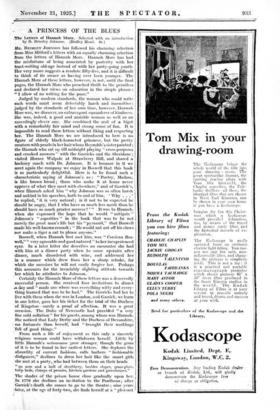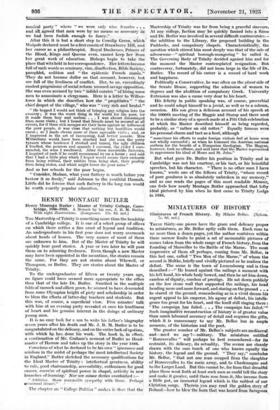A PRINCESS OF THE BLUES
,The Letters of Hannah More. Selected with an introduction by R. Brimley Johnson. (Bodley Head. 6s.)
Ma. BRUMLEY JOHNSON has followed his charming selection from Miss Mitford's letters with an equally charming selection from the letters of Hannah More. Hannah More has had the misfortune of being associated by posterity with her tract-writing old-age instead of with her party-going youth. Her very name. suggests a resolute fifty-five, and it is difficult to think of its owner as having ever been younger. The Hannah. More of these letters, however, is not, until the final pages, the Hannah More who preached thrift to the penniless and_ declared her views on education in the simple phrase : " I allow of no. writing for the poor."
Judged by modern standards, the woman who could write such words must seem detestably harsh and insensitive ; judged by, the standards of. her own time, however,.Hannah More was, we discover, an extravagant squanderer of kindness. She was, indeed, a good and amiable woman as well as an exceedingly clever one. She combined the zeal of a bigot with a. remarkably fair mind and strong sense of fun. It is impossible to read these letters without liking and respecting her. The Hannah More we are introduced to here is no figure of elderly black-bonneted grimness, but the pretty creature with pearls in her hair whom Reynolds's sisterpainted ; the Hannah who sat up till midnight playing " cross-purposes and crooked answers " with the Garrieks and the Sheridans ; visited Horace Walpole at Strawberry Hill, and shared a hackney coach with Dr. Johnson. It is because in it we meet again the company we enjoy in Boswell that this book is so particularly delightful. Here is to be found such a characteristic. saying of Johnson's as : " Poetry, Madam, is like brown bread ; those who make it at home never approve of what they meet with elsewhere," and of Garrick's, ,when Hannah asked him "why Johnson was so often harsh and unkind in his speeches, both to and of him. ' Why . . . ' he replied, it is very natural ; is it not to be expected he should be angry, that I who have so much less merit than he should have so much greater success ? ' " It was to Hannah, when she expressed the hope that he would " mitigate " Johnson's " asperities " in the book that was to be not merely the great man's life but his " pyramid," that Boswell made his well-known remark : " He would not cut off his claws nor make a tiger a cat to please anyone."
Boswell, when Hannah first met him, was " Corsican Bos- well," " very agreeable and good natured " to her inexperienced eyes. In a later letter she describes an encounter she had with him at a dinner party when he came upstairs after dinner, much disordered with wine, and addressed her in a manner which drew from her a sharp rebuke, for which she surmises he will not easily forgive her. Perhaps this accounts for the invariably slighting attitude towards her which he attributes to Johnson.
Certainly the Hannah More of these letters was a deservedly successful person. She received four invitations to dinner .a day and " made one where was everything witty and every- thing learned that was to be had." The Garricks had her to -live with them when she was in London, and Garrick, we learn in one letter, gave her his ticket for the trial of the Duchess of Kingston—surely a proof of affection. It was a great occasion. The Duke of Newcastle had provided " a very fine cold collation" for his guests, among whom was Hannah. She noticed that Lady Derby and the Duchess of Devonshire, ess fortunate than herself, had " brought their workbags "full of good things."
From such a life of enjoyment as this only a sincerely religious woman could have withdrawn herself. Little by little Hannah's seriousness grew stronger, though the germ of it is to be found in her earliest letters. She deplores the absurdity of current fashions, calls barbers " fashionable disfigurers," declines to dress her hair like the smart girls she met at a party,,,who had between them on their heads "an acre and a half of shrubbery, besides slopes, grass-plots, tulip beds, clumps of peonies, kitchen-gardens and greenhouses."
The shades of the prison house close gradually upon her. In 1778 she declines an invitation to the Pantheon; after -Garrick's death she ceases to go to the theatre ; nine years -later, at the age of forty-two, she finds herself at a " pleasant comical party " where " we were only nine females . . . and alLogreed that men were by no means so necessary as
we had -been foolish enough to fancy."
After this it is but a short step to Cowslip Green, which Walpole declared must be a first cousin of Strawberry Hill, and her career as a philanthropist. Royal Duchesses, Princes of the Blood, Kings and Queens even, cannot keep her from her great work of education. Bishops begin to take the place that wits held in her correspondence. Her letters become full of such words as seminary, vice, disaffection, Bible Society, pamphlet, sedition and " the epidemic French mama." They do not become duller on that account, however, but are full of the liveliness of conflict. Her, to us, exceedingly modest prograinine of social reform aroused savage opposition. She was even accused by two " infidel curates "'of hiring some men to assassinate a clergyman. Here is a letter to Wilber- force in which she describes how she " propitiates " " the chief despot of the village," who was " very rich and brutal."
" He begged I would not think of bringing any religion into the country ; it was the worst thing in the world for the poor, for it made them lazy and useless. . . I was almost discouraged from more visits ; but I found that friends must be secured at all events, for if these rich savages set their faces against us: influenced the poor people, it was clear that nothing but hostilities would ensue ; so I made eleven more of these agreeable visits ; and, as I improved in the art of 'Canvassing, had better' success. Miss Wilberforce would have been shocked had she seen the tyrants whose insolence I stroked and tamed, the ugly children I fondled, the pointers and spaniels I caressed, the cyder I com- mended, the wine I swallowed. Alter these irresistible flatteries, I inquired of each if he could recommend to me a house ; and said that I had a little plan which I hoped would secure their orchards from being robbed, their rabbits from being shot, their poultry from being stolen, Lid which might lower the poor rates."
And so her schools for the poor began.
" Consider, Madam, what your flattery is worth before you bestow it so freely," said Johnson to the youthful Hannah. Little- did he foresee that such flattery in the long run would be worth exactly popular education.















































 Previous page
Previous page